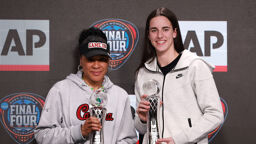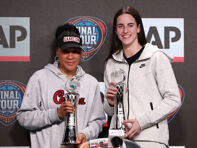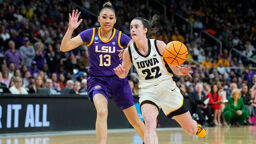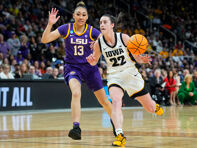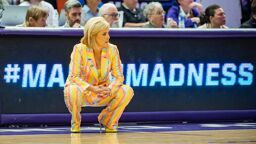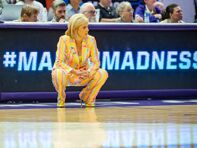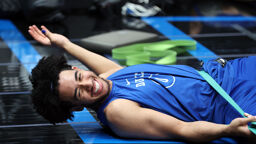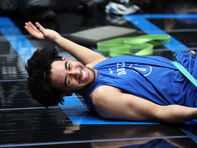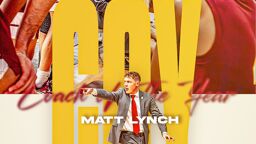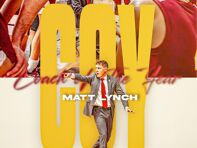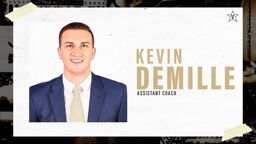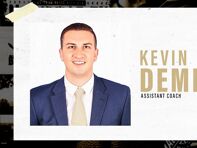At this point, Denison University associate head coach Seth Hayes has coming out down to a science, at least for herself.
After coming out as gay to her high school basketball team, doing so again with her college basketball team and coming out as genderqueer during her coaching career, Hayes holds little pause when it comes to living openly as her true self.
Her confidence is emblematic of the shift represented in a recently released study conducted by Outsports, the University of Winchester and the Sports Equality Foundation. Over 95% of the athletes surveyed reported that coming out to their teammates at the high school and college level were overall “neutral” to “perfect” experiences.
Hayes is counted among that overwhelming majority.
“Their response was great. They loved me for who I am and embraced my girlfriend as well.”
“It was pretty easy for me to do,” Hayes told Outsports of her experience coming out to her high school basketball teammates.
While she knew she identified as gay much earlier in life, one of her coming out catalysts ultimately was a girlfriend she had secretly been seeing.
“I wanted to make that known to my friends, teammates and coaches because I felt safe to do so,” Hayes recalled. “Their response was great. They loved me for who I am and embraced my girlfriend as well.”
The other spark spoke to the effect visibility holds within athletic communities. One of Hayes’ teammates came out before her, and watching her be accepted told Hayes that the time was right.
“It was pretty brave of her to be able to take that deep dive in,” Hayes said. “I came out about a year after she did. At that point, I thought that everybody was going to accept me for who I am just like they did for my teammate.”

Feeling empowered by her athletic peers to live openly in her youth helped the St. Louis native draw a line in the sand for her sports journey.
“Because I had come out in high school, I was like, ‘Well, this is a part of me. I’m not going to hide it any longer.”
She wasted no time coming out to her teammates and coaches at Ohio Wesleyan University, some of whom flew the rainbow proudly as well, in 2007.
“I had no reservations. I knew it was a supportive environment and that I was going to be included in the family system of our team.”
That same familial bond was present when Hayes began examining her gender identity after joining the Denison University coaching staff. She’s proud to be an example of representation for gender-diverse populations in sports — something that Hayes believed would have helped her feel comfortable earlier in her life.
Hayes has made it a mission to continue advancing LGBTQ acceptance in sports beyond the Denison campus. She became one of the first trainers for the NCAA’s OneTeam program in 2018, using her life experiences to better equip Division III athletic departments to understand and embrace LGBTQ athletes.
97% of out LGBTQ athletes say their teammates' responses to them coming out met or exceeded their expectations.
— Outsports (@outsports) October 4, 2021
You can't get 97% of people to agree the earth is round. #OutInSports #TeamLGBTQhttps://t.co/hB9bkxFYbV pic.twitter.com/PNUXQGuvPf
“I wanted current student-athletes to have the same experience that I had,” Hayes said. “I had coaches who were knowledgeable and accepting of all types of individuals when I was in college. I want those people in my position now as coaches and administrators to learn more about how the LGBTQ community is progressing.”
But that desire is even more vital in her role as a coach. Hayes is quick to praise her team’s diversity as something that “makes our team better” because of their ability to learn from each other beyond gameplans.
“You can only teach so much on the court,” Hayes beamed. “It’s a big deal to have the same values as your teammates. What’s important is that they learn what is important to each minority class in order to accept them.”
And when a university’s athletic culture outwardly values diversity and actively promotes inclusion of underrepresented communities, the image spreads to others who may find themselves in the same place Hayes was 15 years ago.
“If there is a community being celebrated through athletics, I think that more students will be able to feel connected to the community and gain knowledge about the celebrated community,” Hayes said. “Hopefully, with more media presence or more acceptance across the NCAA, that will impact campuses and students in a major way.”
The recent Out In Sports study revealed widespread acceptance of LGBTQ athletes who come out to teammates in high school and college. You can find more here.



